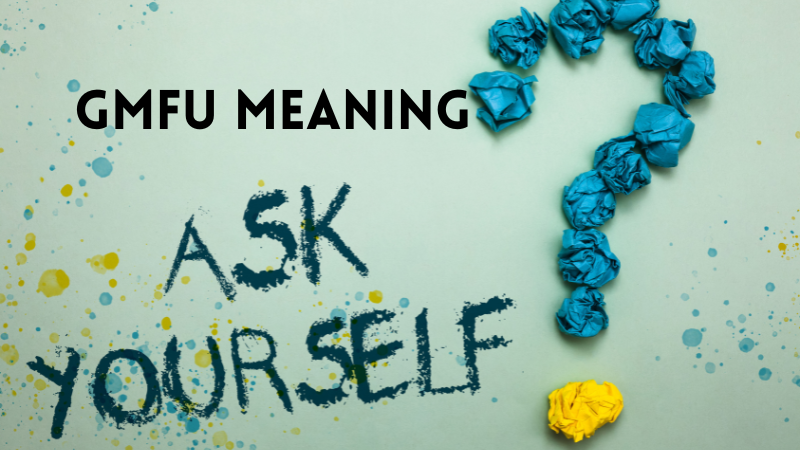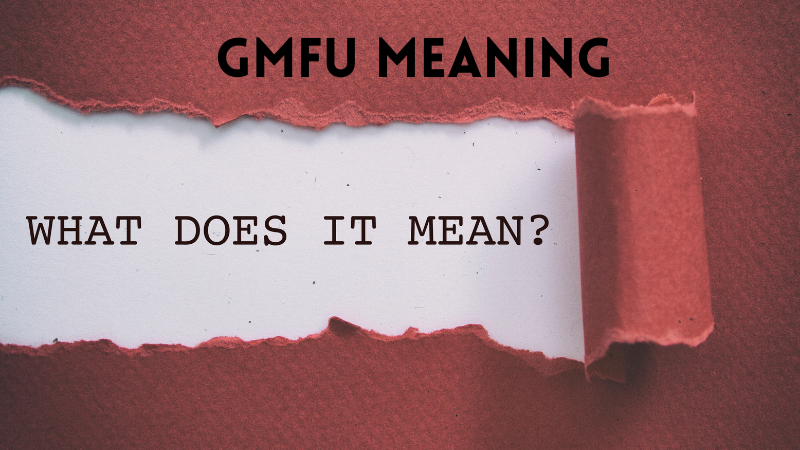GMFU Meaning, In the fast-paced lanes of digital conversations, where every letter counts and emotions are distilled into acronyms, “GMFU Meaning” rises from the noise like a thunderclap. It’s sharp. It’s raw. It’s real. And if you’ve ever felt misunderstood, underestimated, or reborn from betrayal, GMFU is your war cry.
This isn’t just slang. GMFU means “Got Me F*ed Up.”** But within those four letters lies a storm of emotion, defiance, realization, and self-worth. Let us walk through the meaning, usage, and cultural power of this phrase that’s carved itself deep into the online lexicon and the hearts of millions.
What Does GMFU Meaning?
GMFU stands for “Got Me F*ed Up.”** It’s a bold, emotionally-charged phrase used when someone feels:
-
Disrespected
-
Misjudged
-
Betrayed
-
Deeply misunderstood
-
Or simply pushed beyond their limit
This isn’t a polite correction. It’s a fierce, unfiltered declaration—a firestorm erupting from someone who’s had enough.
“You really GMFU if you think I’ll keep quiet.”
“They GMFU thinking I’m still that weak version of myself.”
These statements throb with pain, strength, and awakening. GMFU is not passive. It’s explosive, echoing in the deepest caverns of emotional truth.
Where Did GMFU Come From? A Cultural Snapshot
Though there’s no single timestamp on GMFU Meaning’s birth, it’s rooted in African-American Vernacular English (AAVE) and spread widely through hip-hop lyrics, social media, and memes. It reflects resilience through rage, clarity through chaos, and power reclaimed from pain.
Artists like Bryson Tiller, XXXTentacion, and Rod Wave have infused their verses with GMFU energy, channeling betrayal, heartbreak, and transformation.
Its spread on platforms like Twitter, TikTok, and Instagram gave it global wings, resonating with anyone who’s ever been underestimated or hurt but rose anyway.
The Emotional Layers of GMFU Meaning
Behind those four letters lies a universe of emotion. Let’s break it down:
1. Anger and Betrayal
When someone violates your trust or crosses a boundary, GMFU becomes your sword. It’s not about polite disagreement. It’s about erupting when too much has piled up.
“You GMFU thinking I wouldn’t find out.”
This is confrontation served raw.
2. Defiance and Empowerment
Sometimes, GMFU isn’t about others—it’s about how you’ve grown.
“They GMFU if they think I’m still the same person from last year.”
Here, the phrase becomes a shield—a way to reclaim identity, power, and direction.
3. Grief and Sadness
Surprisingly, GMFU can also hide behind tears and soft regrets. It reflects the pain of feeling abandoned or mistreated by someone close.
“She GMFU when she left me for someone else.”
It’s a whisper of a broken heart dressed as a shout.
How GMFU is Used in Real-Life Conversations
GMFU is versatile. It lives in:
-
Text messages
-
Tweets
-
Captions
-
Songs
-
Memes
In Texts & DMs
“Bro, she GMFU talking to my ex.”
A concise, powerful reaction to drama.
On Social Media
A selfie with a savage caption:
“Smile like you didn’t GMFU last night.”
Social media has turned GMFU into a badge of authenticity. It’s a way to own your scars and flex your strength.
In Music Lyrics
Hip-hop and R&B artists often use “GMFU” as a lyrical sledgehammer, emphasizing betrayal, transformation, and come-up stories. It’s therapy turned into rhythm.
Why GMFU Resonates Deeply with the Youth
In an age where boundaries blur, loyalties shift, and emotions swirl unfiltered online, GMFU becomes a necessary expression.

It speaks to:
-
The heartbreak of ghosting
-
The sting of fake friends
-
The fury after being used
-
The rebirth after being broken
It’s the anthem of a generation that refuses to stay silent or broken.
GMFU vs. Other Internet Slang: A Unique Edge
While other slang terms like:
-
SMH (shaking my head)
-
IDGAF (I don’t give a f*)**
-
WTF (what the f*)**
…convey emotions, GMFU is visceral and personal. It’s not just reacting; it’s standing up and taking emotional ownership.
GMFU is you-centered, making it more intimate and explosive than other acronyms. It has a backbone, a rhythm, and a sharp edge.
Should You Use GMFU? Understanding the Social Context
While powerful, GMFU is explicit. Here’s when to use it, and when to leave it behind:
✅ Use it when:
-
Speaking to close friends who understand the tone
-
Posting expressive content on personal social media
-
Writing lyrics or creative pieces with emotional weight
❌ Avoid it when:
-
In professional environments
-
Communicating formally or diplomatically
-
Around individuals sensitive to strong language
Tone and timing are everything. GMFU works best when you need to be bold and brutally honest.
Popular GMFU Quotes and Captions
Need a punchy line that hits home? Try these GMFU-flavored captions:
-
“I’m not bitter, I just remember who GMFU.”
-
“New mindset, same heart. Don’t GMFU again.”
-
“I loved hard. You played harder. You GMFU.”
-
“Lesson learned: Never let someone GMFU twice.”
-
“If you think I’m coming back… GMFU.”
The Psychology Behind the Phrase
GMFU is also a form of emotional validation. It allows people to:
-
Process betrayal
-
Define personal boundaries
-
Articulate emotional awakenings
-
Rebuild inner strength
It may be slang, but it’s deeply therapeutic, functioning like a verbal scar—you remember the pain, but also that you survived it.
Conclusion: GMFU as a Modern Battle Cry
GMFU is more than a phrase—it’s a pulse. It lives in our texts, our captions, our playlists, and our private emotional archives. It reminds us that being hurt doesn’t mean staying silent. It’s a rebellious whisper against disrespect, a shout for emotional clarity.
So, next time someone misreads your silence, forgets your worth, or crosses your boundary…

